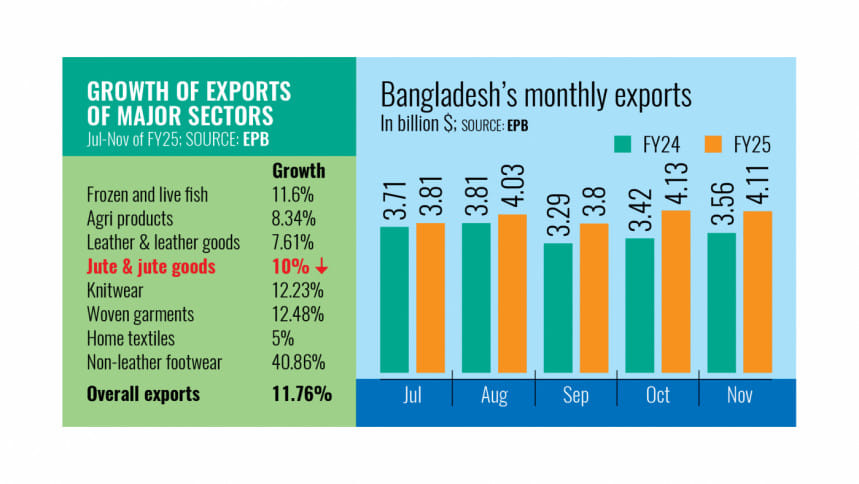Buoyancy in exports continues

Bangladesh's exports rose for a fourth straight month in November as goods that had been stuck for the past three months were finally shipped.
A general increase in the flow of orders due to an improvement in the global economy and the Christmas shopping season, which is now in full swing, also played a role.
Data released by the Export Promotion Bureau (EPB) yesterday showed that exports surged nearly 16 percent year-on-year in November to $4.11 billion, welcome news for an economy that has faced various challenges, including a US dollar crunch, in recent times.
Garments, which bring in more than 80 percent of the South Asian country's annual export receipts, recorded 16 percent year-on-year growth in shipment value in November.
The gains were led by shipments of woven garments, up 20 percent, while knitwear exports increased 12.8 percent, EPB figures showed.
Shipments of the rest of the major sectors -- frozen and live fish, agricultural products, and jute and jute goods -- also reflected a year-on-year rise last month, but exports of leather and leather products dropped.
This boosted total exports in the first four months of FY25 to $19.9 billion, a 12 percent year-on-year increase.
"The reason behind soaring exports was the release of goods that we could not ship in the first three months due to political and labour unrest," said Mohammad Hatem, president of the Bangladesh Knitwear Manufacturers and Exporters Association.
Bangladesh saw a political changeover on August 5 as the Awami League government was ousted by a student-led mass uprising.
An interim government was later sworn in, but industrial production suffered heavily due to repeated incidents of labour unrest, particularly in industrial belts such as Savar and Ashulia on Dhaka's outskirts.
Hatem said exporters had received some fresh orders but added that international clothing retailers were offering reduced prices.
"It appears they are trying to take advantage of the labour unrest and political situation. They think we are in trouble although we don't think so," he said.
"We are positive because of support from global leaders, especially Europe and the US, for Chief Adviser Muhammad Yunus and a recovery in gas supply to factories. If the gas supply increases further, our exports will jump."
Knitwear exporters, who accounted for 45 percent of total exports in the period, fetched $8.9 billion while exports of woven garments, which accounted for 36 percent of total earnings, brought in $7.17 billion.
Faruque Hassan, a former president of the Bangladesh Garment Manufacturers and Exporters Association, said product and market diversification had an impact.
"We are making more high-value items. But that does not mean we are getting higher margins. We do not receive additional cutting and making charges. Many factories are taking orders at prices below or equal to production costs," he added.
Hatem said he had to refuse an order because it would cause him to incur a big loss.
At a press conference yesterday, EPB Vice-President Md Anwar Hossain said exports returned to positive territory as normalcy was restored to industries following a spate of labour unrest.
Nasir Khan, chairman and managing director of Jennys Shoes, a local manufacturer and exporter, said there was no significant growth in leather footwear exports, the leather sector's main export item.
"It is temporary," he said, opining that leather footwear exports would rise if the interim government reduced licensing and certification requirements.
Khan claimed that a 50 percent value addition is possible in the local footwear industry, presenting a significant opportunity for export diversification.
Additionally, Western economies have started to recover from economic slowdowns and buyers are slowly returning to Bangladesh.
Md Luthful Bari, director for operations at Meghna Group of Companies, said bicycle exports have not started to rebound as buyers are not placing new orders.

 For all latest news, follow The Daily Star's Google News channel.
For all latest news, follow The Daily Star's Google News channel. 








Comments